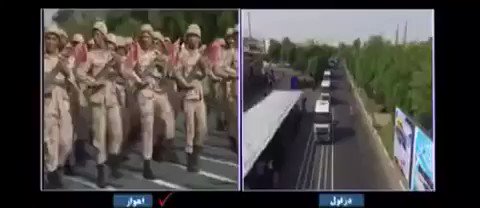Results 1 to 3 of 3
Thread Information
Users Browsing this Thread
There are currently 1 users browsing this thread. (0 members and 1 guests)
Threaded View
-
09-23-2018, 03:33 PM #1
Iran summons western diplomats in wake of terrorist attack on military parade
Iran summons western diplomats in wake of terrorist attack on military parade
September 23, 2018
Dozens of people, including civilians, were killed or wounded in the attack.
By Rick Moran
The Iranian foreign ministry summoned western diplomats from Britain, Denmark and the Netherlands early Sunday for allegedly harboring Arab separatists who Tehran believes planned and carried out an attack on a military parade in the city of Ahvaz.
The attack targeted members of Iran's Revolutionary Guards who were marching in a parade to commemorate the start of the Iran-Iraq War in 1980. State TV reports that 29 people were killed and more than 60 injured.
An Arab separatist group claimed responsibility for the attack. CNN reports that "Iranian Foreign Minister Mohammad Javad Zarif also blamed "a foreign regime" backed by the United States." Press TV ✔ @PressTV
Press TV ✔ @PressTV
Video at the tweet
UPDATE
Live video captures the moment of #Ahvaz terrorist shooting http://ptv.io/2dem #IranMilitaryParade
3:06 AM - Sep 22, 2018
"Terrorists recruited, trained, armed & paid by a foreign regime have attacked Ahvaz," Zarif said in a tweet, adding: "Iran holds regional terror sponsors and their US masters accountable for such attacks."All signs point to Arab separatists carrying out the attack, including an interview on Saudi TV with an Arab activist representing the Arab Struggle Movement to Liberate Ahvaz, who gave details about the attackers. Not wanting to be left out of the media coverage, Islamic State also claimed responsibility.
Earlier, Iranian President Hassan Rouhani used the occasion of the military parades to compare US President Donald Trump to the former Iraqi dictator Saddam Hussein, Press TV reported.
Speaking at a military rally in Tehran, he said Trump will fail in the "economic and psychological war" he's launched against Iran, just as Hussein failed in his eight-year war against the Islamic Republic.
"Iran will neither abandon its defensive weapons nor will reduce its defense capabilities," Rouhani said.
"Rather it will increase its defense power day by day. The fact that they are angry at our missiles shows that these are the most influential weapons Iran has."
Syrian President Bashar al-Assad and Hezbollah, two of Iran's closest allies, issued statements condemning the attack, with Assad referencing outside involvement and Hezbollah echoing allegations of US blame.
"We are with you with all the power we have" to stand against these terrorist acts, Assad said in a cable to Rouhani extending condolences, the state-run Syrian Arab News Agency reported. "We hope that the backers, financers and proponents of terrorism will understand that this danger threatens mankind as a whole."
Hezbollah in a statement said "satanic and malignant hands are behind this terrorist action," and accused the United States and its allies of conducting the attack "directly or by proxy." The attack is intended to undermine Iran's security and stability and as "punishment for ... its rejection of American dependency politics," the statement claimed.
The US strongly condemned the attack as well.
If the terrorist attack was carried out by the separatists it would represent a quantum leap in their capabilities. Previously, their attacks were on oil pipelines in the dead of night. This was an assault in broad daylight. Perhaps more significantly, it was a suicide attack. Surely the gunmen, dressed in military uniforms, could not have hoped to escape a venue where there was a massive police and army presence.
In fact, the attack bears a greater resemblance to something ISIS would have done. So why would the Iranian government blame Arab separatists with so little proof?
The region where the attack occurred has seen many large demonstrations over the last 6 months. The protests were not only for equality for Arabs, but they were also demonstrations against regime economic policies. The Iranian government may be seeking an excuse to crack down on dissidents in the region in order to deal with the constant unrest.
In the past, including a similar attack in June, 2017, Tehran used the cover of a terrorist attack to oppress dissident voices across the country. It is believed that the 2017 attack was carried out by ISIS. In the case of the Ahvaz attack, it was clearly in the government's best interests to blame Arab separatists.
Terrorism is never right, no matter who gets hit. In this case, many civilians were killed and wounded. It is the bane of the 21st century and should be opposed wherever it happens.
Follow us: @AmericanThinker on Twitter | AmericanThinker on Facebook
https://www.americanthinker.com/blog...ry_parade.html
Similar Threads
-
Trump expelling 60 Russian diplomats in wake of UK nerve agent attack
By JohnDoe2 in forum Other Topics News and IssuesReplies: 0Last Post: 03-26-2018, 12:38 PM -
Military Briefed Obama On Benghazi Terrorist Attack
By AirborneSapper7 in forum General DiscussionReplies: 0Last Post: 01-16-2014, 04:21 AM -
Russia Is Massing Troops On Iran's Northern Border Waiting For Western Attack
By CCUSA in forum Other Topics News and IssuesReplies: 0Last Post: 04-13-2012, 10:28 PM -
NATO preparing to attack Syria: Iran issues veiled military
By AirborneSapper7 in forum Other Topics News and IssuesReplies: 0Last Post: 10-06-2011, 04:03 AM -
Deploy the Military AFTER the Terrorist Attack
By Scarecrow in forum General DiscussionReplies: 11Last Post: 08-08-2005, 10:54 PM


 LinkBack URL
LinkBack URL About LinkBacks
About LinkBacks







 Reply With Quote
Reply With Quote


Man Involved in Four-Car Crash That Left Maine Woman Dead...
05-10-2024, 04:18 PM in Americans Killed By illegal immigrants / illegals